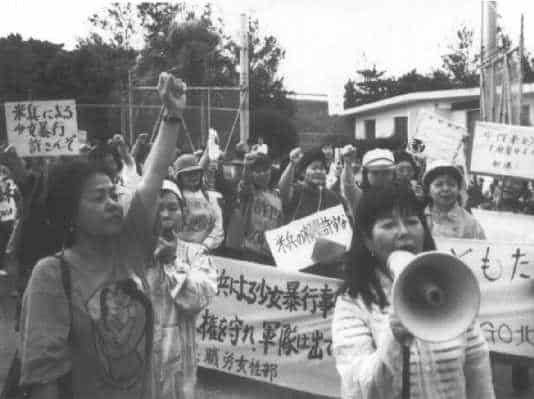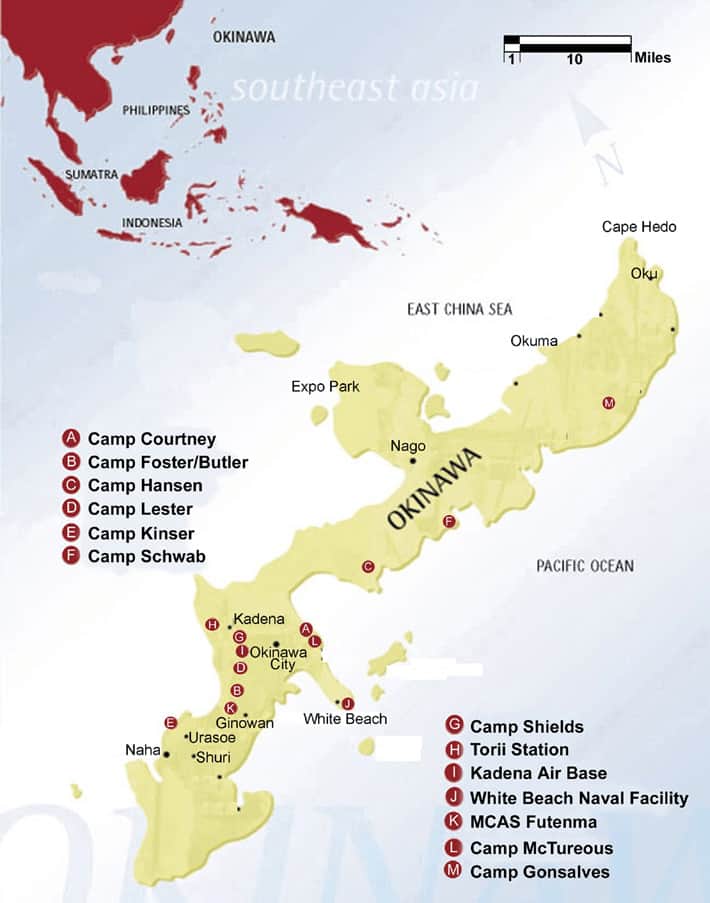It’s hard to imagine U.S. foreign policy in East Asia without its closest partner and ally in the region: Japan. Yet relations between the two allies have not always been close nor has their shared history been without its crises. While it may seem that the alliance between Japan and the United States has always been in its strong present state and that the military bases in Okinawa have always been accepted, this could not be further from the case, especially during the 1995 Okinawa Rape Incident.
Following the end of the Second World War, Japan had been occupied and humbled by the allies, led by the United States. However, as the war ended, a new conflict in the form of the Cold War with the USSR began, leaving Japan in a precarious position. As the Chinese Civil War ended with a Communist victory and Korea became a major strategic concern, Japan’s role went from an occupied enemy to a friend and partner in the fight against Communism. Japan, as Prime Minister Nakasone put it, became “an unsinkable aircraft carrier.” As part of the U.S.-Japan alliance, especially through the Status of Forces Agreement signed in 1960, Okinawa retained its U.S. military bases while U.S. servicemen gained some degree of extraterritoriality. Tensions over trade issues and the security agreement itself were already high when the Okinawa Rape Incident of 1995 occurred, causing wide-spread anger towards the U.S. presence and shining a spotlight on long-neglected Okinawa. The crisis also exposed differences of opinions between the military stationed on Okinawa and diplomatic personnel in the embassy in Tokyo, both of which wished to proceed in their own ways.
During this time, Foreign Service Officer Rust Deming was serving in Japan as the deputy chief of mission to political appointee Ambassador Walter Mondale. During the crisis, Deming helped in navigating the complex Japanese-American relationship by balancing security with politics and economics, all of which had been straining the alliance. Later, he served as chargé d’affaires and throughout his career, faced multiple other crises and disputes between Japan and the United States.
Rust Deming’s interview was conducted by Charles Stuart Kennedy on December 8, 2004.
Read Deming’s full oral history HERE.
Drafted by Leon Cao
ADST relies on the generous support of our members and readers like you. Please support our efforts to continue capturing, preserving, and sharing the experiences of America’s diplomats.
Excerpts:
“From our point of view, we needed to move rapidly to get ahead of events by apologizing and taking appropriate responsibility.”
The 1995 Okinawa Rape Incident: In September of 1995, two Marines and a Navy corpsman kidnapped an 11-year-old [12-year-old] Okinawan girl, took her out in a van, and gang raped her. It had all the elements of an explosive situation. There was tension between the U.S. military and the Embassy on how to handle the incident. From the U.S. military point of view, it was important to protect due process and the rights of the accused servicemen and not to do anything that implied that they were guilty before they had gone through the appropriate legal process. From our point of view, we needed to move rapidly to get ahead of events by apologizing and taking appropriate responsibility. Ambassador Mondale happened to be in the U.S. when this happened. He got back a day or two later, and one of the first things he did was meet with the Foreign Minister and apologize. The military was very uneasy about this apology, the lawyers in particular, because they were concerned that it could be regarded as “command interference” in the judicial process. But from our point of view, we had to get ahead of the political curve to avoid an explosion. Thanks to Ambassador Mondale’s intervention with Washington, the President personally apologized a day or two later and that helped a great deal in containing the incident.
“There was tremendous pressure building to get these people off the U.S. base and into Japanese custody, even though the Japanese police were able to question the suspects on the U.S. base.”
Custody and Extraterritoriality: The next issue was whether and when to turn over the accused to Japanese custody. The individuals that had committed the crime had dropped the girl off and then gone back to their American base where they were arrested by U.S. MPs. The Japanese wanted immediate custody, but under the Status of Forces Agreement, if the U.S. arrests an American serviceman for a crime against a Japanese, Japan does not get custody until these people are indicted. In the Japanese system, the indictment is a very long process. They don’t indict until they have the whole case lined up and ready to go to trial. There was tremendous pressure building to get these people off the U.S. base and into Japanese custody, even though the Japanese police were able to question the suspects on the U.S. base. It was a perception issue.
Both the embassy and the U.S. military agreed that we needed to protect our prerogative under the Status of Forces Agreement. At the same time, we wanted to diffuse the public outcry as quickly as possible. The solution we found was to lean very heavily on the Japanese to issue the indictment so we could hand over the prisoners, and they did this in record time. At the same time, we worked out an agreement with the Japanese that in future cases of “heinous crimes like rape and murder,” the U.S. would consider favorably a GOJ request to turn people over before indictment. That agreement was not popular with the military lawyers, but it took a lot of the heat off us in Japan.
“The Okinawa rape incident came at the worst possible time because the trade issues had created a lot of tension in U.S.-Japan relations, and anti-American feelings in Japan were already running high.”
The Larger Picture: The Okinawa rape incident came at the worst possible time because the trade issues had created a lot of tension in U.S.-Japan relations, and anti-American feelings in Japan were already running high. The rape incident sparked a public debate in Japan about the need for U.S. bases, at least in their current numbers, after the end of the Cold War. Moreover, for the first time since the reversion of Okinawa to Japan in 1972, Japanese in the mainland took a real interest in what was happening in Okinawa. In this very difficult environment, President Clinton was due to come to Japan in November for the APEC summit. We were really scrambling to try to get things back in order. In the event, the President postponed his trip because of the deadlock with the Congress over the budget. He didn’t come until the following spring which turned out to be a blessing because it allowed enough time to get the Okinawa incident behind us. Overall, I think the Embassy, working with U.S. Forces in Japan and our military counterparts in Okinawa, did the very best we could to manage a very difficult situation. That was the most dramatic situation I faced.
“There was a lot of tension to all of this.”
Military Understanding: Yes, on different levels. The military lawyers behaved like lawyers: “Don’t Give up a thing, don’t admit anything.” The senior military officers recognized the need for political steps to defuse the crisis, but at the same time they didn’t want to put in jeopardy future operational rights and restrict themselves. There was a lot of tension to all of this.
“One of the things that I learned from this incident is the importance, in Japan and elsewhere, of acting quickly to take responsibility.”
The Servicemen: They were tried by the Japanese and given what I would call a very lenient sentence of three or four years which they have now served, and they have been released. Once the Japanese got custody, they dealt with them very quickly and fairly and leniently to a great degree, but the political heat had gone out of it by then. One of the things that I learned from this incident is the importance, in Japan and elsewhere, of acting quickly to take responsibility. If you face up to the situation and admit responsibility immediately, you take a lot of heat out of it. If you drag it out, you just create all sorts of unnecessary problems.
“The basic rule we established was that the Embassy and the U.S. military would never go back to Washington with a split position if we could possibly help it.”
Military-Civilian Cooperation: In terms of my personal time, I spent a lot on political-military issues, working with the U.S. military in Japan. My counterpart was the chief of staff of U.S. forces Japan, Marine Major General Peter Pace who I mentioned is now the Deputy JCS chairman of the joint chief of staff. He and I had been at the War College together. The Ambassador dealt with Lieutenant General Dick Myers who was the Commander of U.S. Forces Japan and is now chairman of the Joint Chiefs of Staff. We went through a lot of crises together and tried to solve a lot of issues. The basic rule we established was that the Embassy and the U.S. military would never go back to Washington with a split position if we could possibly help it. We would solve issues in country, and we did this, without exception. I think this was a remarkable achievement. It demonstrated that we had such a degree of trust between us that we could work it out. When we went back to Washington with joint Embassy-U.S. Force Japan cables, the most senior levels of the USG listened to what we had to say.
“Somehow, the Japanese radar or gunner locked onto the aircraft rather than the drone and shot the airplane down.”
Other Incidents: Well, it’s amazing that there are almost no incidences of unprovoked violence against Americans in Japan. It’s remarkable in view of the fact that Japan is hosting 50,000 foreign troops. There was not really an analogous situation, but I can think of a moment when the Japanese had to come to us to apologize for something. The U.S. Navy and Japanese Maritime Self-Defense Forces were training together off Hawaii, and a Japanese destroyer was firing at a target that was being towed by a U.S. Navy A-4 aircraft. Somehow, the Japanese radar or gunner locked onto the aircraft rather than the drone and shot the airplane down. Fortunately, the pilot got out. Yes, but this time the two navies got along. The U.S. Navy handled the incident beautifully. They downplayed the whole affair, treating it as a normal training accident, pointing out that the A-4 was over 30 years old and due to be retired. We obviously got a lot of apologies from the Japanese. It was a tremendous embarrassment to them, not just because of what happened but because it showed what looked like the amateurism of the Japanese navy.
TABLE OF CONTENTS HIGHLIGHTS
Education
BA in Political Science and English, Rollins College 1960–1964
MA in International Relations, American University 1964–1966
MA in East Asian Studies, Stanford University 1980-1981
Joined the Foreign Service 1966
Tokyo, Japan—Head of External Political Section 1981–1985
Tokyo, Japan—Deputy Chief of Mission 1993–1997
Tunis, Tunisia—Ambassador 2001–2003


